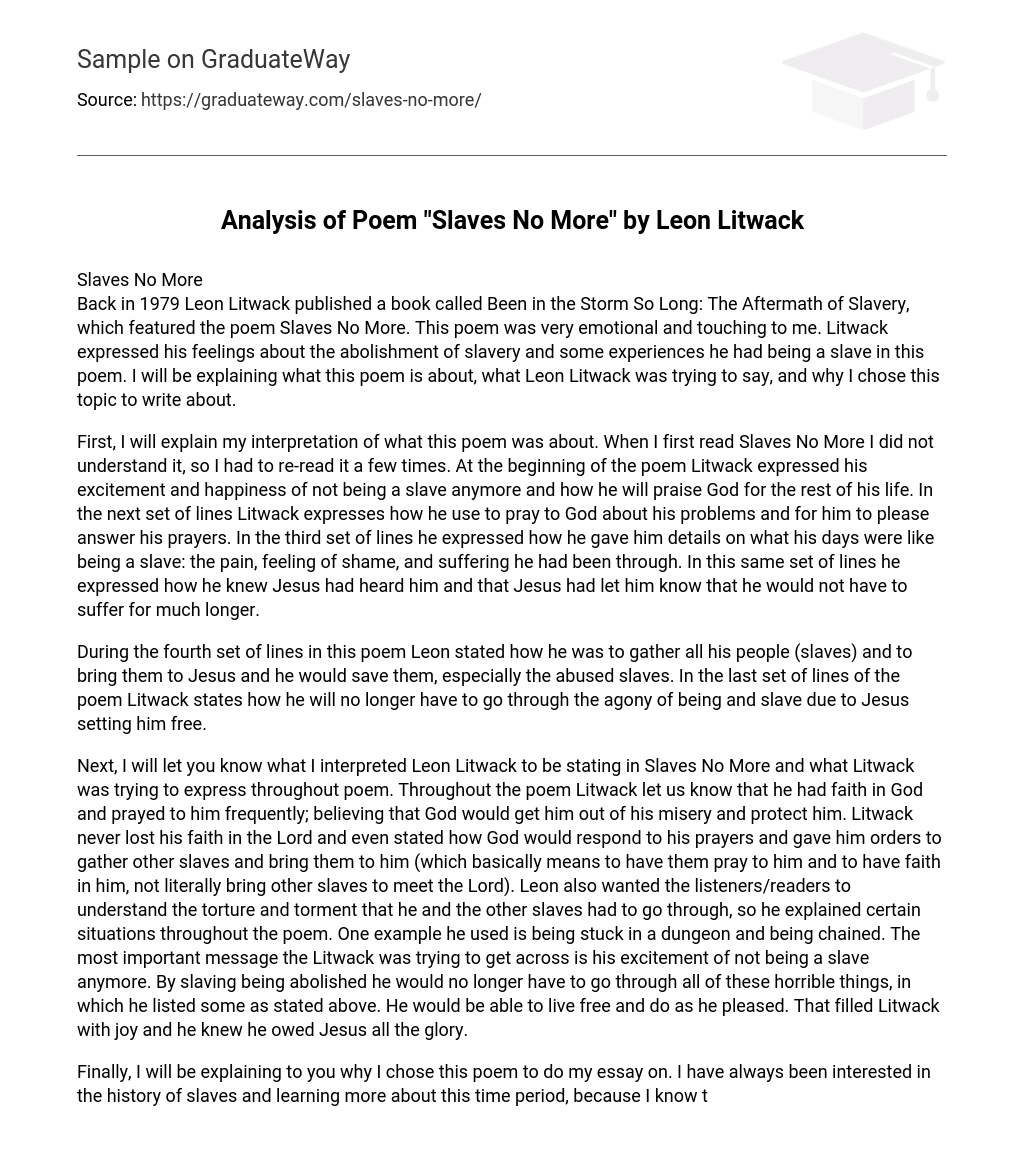In his 1979 book “Been in the Storm So Long: The Aftermath of Slavery,” Leon Litwack includes the impactful poem “Slaves No More.” This poem deeply resonated with me, as it is filled with overwhelming emotion. Litwack not only expresses his own experiences as a former slave but also reflects on the freedom of slaves. In my essay, I will analyze the content of this powerful poem, explore Leon Litwack’s intended message, and explain why I have selected this topic for my writing.
Initially, upon my first reading of the poem Slaves No More, I struggled to comprehend its message and had to read it multiple times. The beginning of the poem highlights Litwack’s immense joy and contentment at no longer being enslaved, as he expresses his intention to worship God for the rest of his life. Subsequently, Litwack reveals that he used to pray to God, seeking resolution for his problems and pleading for answers to his prayers. In the following stanza, he vividly describes the hardships endured as a slave: physical pain, feelings of shame, and overall suffering. He also acknowledges within this same stanza that Jesus heard his prayers and reassured him that his suffering would be short-lived.
In this poem, Leon expressed his intention to gather all his people, specifically the abused slaves, and bring them to Jesus for salvation. The final lines of the poem highlight Litwack’s relief at no longer enduring the agony of slavery, as Jesus has liberated him.
In Slaves No More, Leon Litwack expresses his unwavering faith in God and the belief that praying to Him will bring solace and protection. He remains devoted to the Lord and envisions Him commanding him to lead other slaves in having faith and prayer. Throughout the poem, Litwack depicts the suffering he and fellow slaves endured, such as being confined in dungeons, but his primary focus is on his joy at no longer being enslaved. With slavery abolished, Litwack imagines a life of freedom and happiness, giving all credit for this liberation to Jesus whom he owes everything.
My interest in the history of slaves and my desire to learn more about this time period led me to select this poem for my essay. I have always been aware that there is much more to slavery stories than what is depicted on TV, so I make it a point to read any writings about slavery that come my way. Initially, I struggled to comprehend this poem because of its use of dialect, but after multiple readings, I eventually understood Litwack’s intended message. What impacted me the most were the examples and emotions he shared from his time as a slave, which gave the poem an authentic feel. Furthermore, I was astonished by how he managed to convey his experiences without delving into excessive detail; his writing still evoked a sense of conflict.
The aspect that fascinated me the most was Litwack’s portrayal of his relationship with God. Through incorporating his dialogues with God in the poem, he succeeded in establishing a connection with readers who also have faith and trust in God. His unwavering devotion to the Lord formed a strong bond between me and Litwack. Furthermore, these conversations with God effectively set the foundation for the poem’s plot. Moreover, Leon’s initial enthusiasm at the start of the poem grabbed my attention and established its overarching theme. All in all, I found this captivating poem worthy of selection for my essay.
Leon Litwack demonstrated exceptional skill in crafting this poem titled “Slaves No More.” The poem, though short, encompasses a myriad of emotions and narratives, rendering it truly astonishing. Despite requiring multiple readings to fully grasp its significance, in the end, the effort invested was undoubtedly rewarding.





